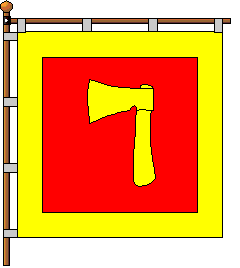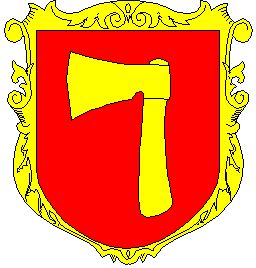 (1:1)
(1:1)from the site of Ukrainian Heraldry

Last modified: 2018-12-15 by rob raeside
Keywords: toporiv | lviv | axe |
Links: FOTW homepage |
search |
disclaimer and copyright |
write us |
mirrors
 (1:1)
(1:1)
from the site of Ukrainian Heraldry
See also:
From the site of Ukrainian
Heraldry:
"In March 23, 1994 the session of the town council approved
the gonfalon: a square canvas with a ratio of 1:1. In a red field
there is a yellow axe. All sides of the gonfalon have yellow
edging with a width of 1/8 from a width of the gonfalon."
Phil Nelson, 7 July 1999

from the site of Ukrainian Heraldry
From the site of Ukrainian
Heraldry:
"On the 19th of April 1994 town council session confirmed a
modern emblem - in an or field there is a gules squirrel, at the
sable chief there are two miner's hammers in cross on the sides
of which or pine-cones. The squirrel is a representative of local
fauna, the or cones denote the name of the town and the sable
color and hammers signify coal industry. The author is
A.Grechylo."
Phil Nelson, 7 July 1999
From the site of Ukrainian
Heraldry:
"City in Lviv Oblast. The settlement appeared in the XVII
century when Andrew Tenchyns'kyi issued an order about location
of a town named Toporiv (from a family emblem of the
Tenchyns'kyis -"Topir" (axe)).On the 24th of February
it was given the Magdeburg Right."
Phil Nelson, 7 July 1999
My ancient encyclopedia says, under the heading
"Magdeburg", "Magdeburg became a flourishing
commercial town during the 13th century, and was an important
member of the Hanseatic League..."Magdeburg law"
(Magdeburger Recht), securing the administrative independence of
municipalities, was widely adopted." Perhaps where the
source says "was given Magdeburg right" we should
translate "received the right of civic self-government"
or something similar.
John Ayer, 8 July 1999